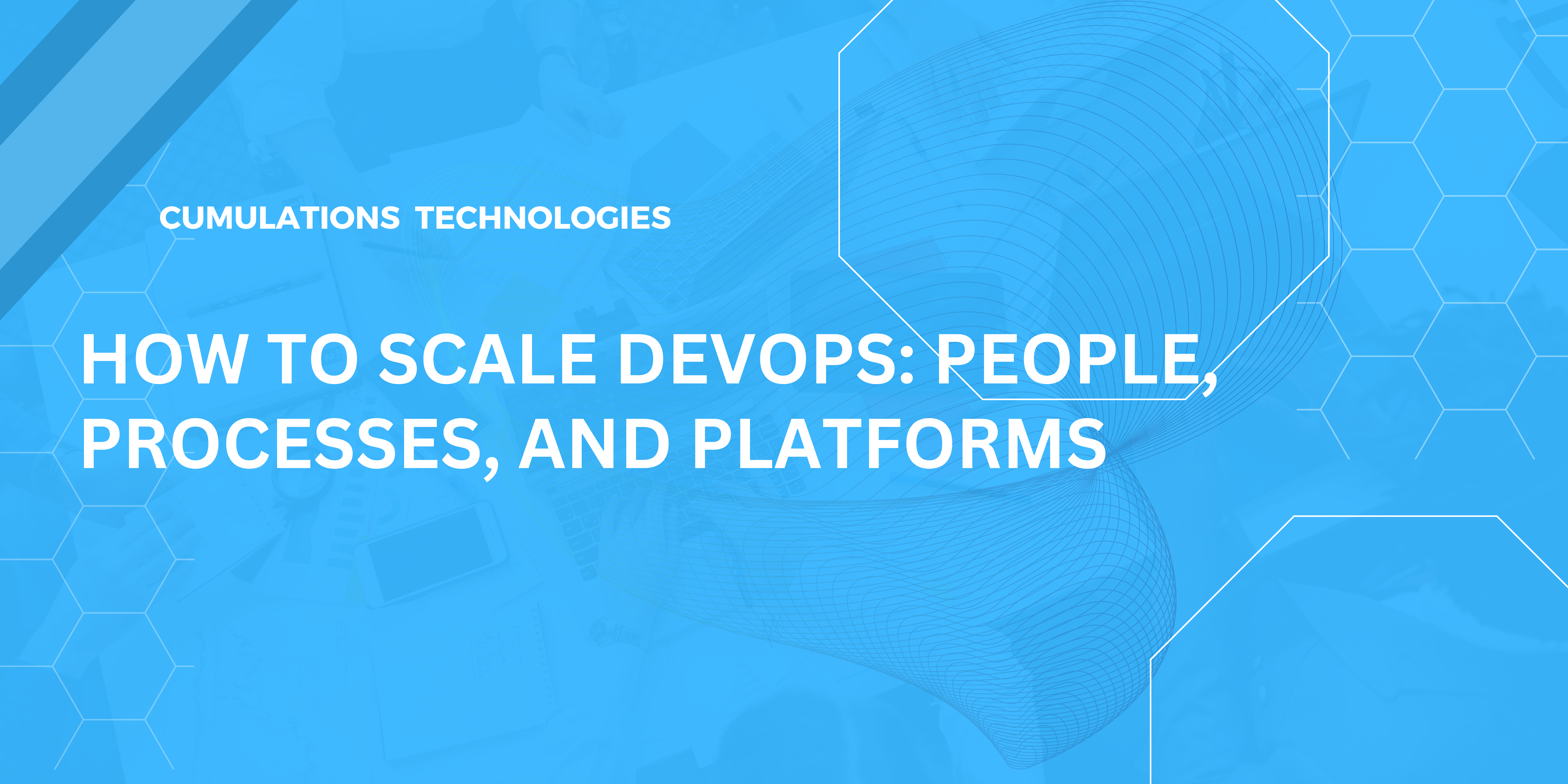
A strategic approach works better when it comes to scaling DevOps. It works effectively to integrate people, processes, and platforms. With the growth of organizations, many challenges arise including automation and improving continuous improvement, collaboration, and innovation.
Businesses need to have a highly skilled team to streamline the process. They should also harness the potential advantages of various scalable platforms. It helps them improve their productivity, and delivery cycles, and minimize bottlenecks. In this post, we will discuss everything in detail to scale DevOps.
What is Scalability in DevOps?
Scalability in DevOps indicates the overall ability of teams, systems, and processes to handle increasing workloads. It includes various tasks like creating workflows and designing an infrastructure that can grow in capacity even without compromising its reliability and performance.
If we talk in the DevOps context, scalability indicates the scaling of automation tools, CI/CD pipelines, and monitoring systems with the increase in demand for apps and services. It enables for quick deployment, minimal downtime, consistent quality, etc.
So, if you need to achieve scalability, you should have powerful containerization, architecture, cloud-native solutions, and microservices. It allows businesses to adapt fast to the changing business requirements and user demands.
When *not* to Scale DevOps
Scaling DevOps becomes necessary to improve an organization’s capability and efficiency of software development. But, scaling DevOps in certain scenarios is certainly useless. We will discuss here some of these scenarios and thus prevent businesses from facing unwanted challenges.
1. Immature Processes
You need to understand that starting and scaling DevOps in the enterprise needs a fully established process. But, if your organization has immature processes or your teams use only basic tools and techniques, scaling soon leads to creating several issues. The immature process, on the other hand, also lacks the stability and repeatability needed for scaling. Before you consider scaling, make sure you follow the right DevOps practices.
2. Cultural Resistance
DevOps is also about culture, apart from tools and processes. So, if there’s any resistance to change within your company, especially from teams or stakeholders, scaling DevOps certainly can’t be a viable solution for you. When it comes to cultural shifts, it often takes time.
So, if you try to scale DevOps with resistance, it leads to decreased morale, friction, and also a lack of goals, and alignment. Therefore, it’s highly important to address cultural issues first, which improves the collaboration mindset across all teams before they move to scale.
3. Lack of Automation
Automation is one of the most important things for DevOps for various reasons such as continuous integration, deployment, and delivery. But, if your business is yet to adopt automation, scaling DevOps will certainly not help you in any way.
Without proper automation, scaling DevOps causes increased manual efforts, which causes slow deployment, more errors, decreased efficiency, etc. So, before scaling, you need to ensure full automation of your testing and scaled agile framework DevOps, CI/CD pipelines, and infrastructure management. These should be capable of handling the increased load that comes with scaling.
4. Inadequate Tooling
Tools are highly important to ensure the success of DevOps practices. So, if you find the existing tools of your business are not able to support scaled environments, attempting to scale causes distorted communication, deployment processes, and monitoring.
Therefore, it’s significant to determine whether the tools have the capability of handling the increased complexity caused by scaling or not.
It includes assessing version control systems, monitoring tools, deployment pipelines, collaboration platforms, and more. You can ensure DevOps at scale only when you use the best tools in place that can scale perfectly with your processes.
5. Resource Constraints
It’s not possible to scale DevOps without proper investment in human and technical resources. If your business faces issues like resource constraints, including a shortage of skilled personnel, or budget limitations, starting and scaling DevOps in the enterprise may lead to several problems.
It’s vital to ensure you get several necessary resources, which are available to support a scaled DevOps environment. It includes several things like adequate training, staffing, and infrastructure.
6. Unclear Objectives
Make sure you have a clear objective to scale DevOps. Otherwise, it could make your effort futile and also lead to a waste of resources. If you don’t have a fully defined reason for scaling, your scaling effort tends to become ineffective and also directionless. Therefore, you need to ensure your goals for scaling are measurable, clear, and aligned perfectly with your business strategy.
The 3 Ps of Scaling DevOps
The 3 Ps of scaling DevOps stands for ‘People, Process and Platform’. These serve as a platform that plays a vital role to ensure DevOps at scale smoothly and also a higher sustainably. Each of these factors is necessary in its own right. But, they are indeed highly effective when integrated and optimized together.
1. People
People are important to make any DevOps strategy successful. Scaling DevOps can be an important challenge without the use of the right mindset, talent, culture, and more. With the growth of organizations, the complexity of the system increases at the same pace. So, they need a skilled team in software development, continuous delivery, and operations.
As mentioned above, the most crucial factor in DevOps is improving a culture of continuous learning and collaboration. Always keep in mind; that DevOps is not about set practices but a cultural shift that can minimize the gap between development and operation teams
Encouraging a shared responsibility for the software delivery process enables teams to work with efficiency and also in the most effective way. When the organization scales, it should invest in ongoing training and also development to ensure that its teams remain updated with advanced tools and methodologies.
2. Process
The process for DevOps is important for scaling. During the early stages of DevOps adoption, the process can be relatively informal or even ad-hoc. Meanwhile, with the growth of organizations, it becomes necessary to formalize these crucial processes to ensure full reliability, consistency, and efficiency
Automation is pivotal to scaling DevOps processes. Be it automated testing, continuous integration, or continuous deployment pipelines, these are useful to minimize manual effort, reduce error, and increase the delivery process. These automated processes enable the team to concentrate on value-added tasks, including enhancing the performance of applications and security.
Governance is another important aspect of process scaling. With the scale of DevOps, businesses should implement their policies to ensure full compliance with the latest regulations and industry standards. The balance is something that can be achieved through several practices such as IaC (Infrastructure as Code). It ensures consistent and also repeated deployments that are easy to manage and audit.
3. Platform
The platform includes many tools and technologies that support various practices of DevOps. Since the complexity of IT infrastructure increases for any organization as it scales, it makes it mandatory to use the most powerful and flexible platform. The platform should be able to handle different environments and workloads.
Cloud computing can become the most crucial element of the DevOps platform.
It provides the flexibility, scalability, and also several resources required to support growing teams and applications. Businesses can scale their infrastructure with cloud services. With the scaled infrastructure, businesses can automate provisioning, meet demand, and also ensure higher availability.
Many orchestration and containerization tools including Kubernetes and Docker further improve the scalability of the platform. These technologies ensure consistent environments for development, deployment, and testing, irrespective of underlying infrastructure. This consistency minimizes deployment issues and increases the release cycle.
Monitoring and observability tools are necessary to scale DevOps, apart from cloud and containerization. With the growth of complexity, these tools offer real-time insights into app performance. It enables teams to identify fast and thus resolve issues before they impact users.
Budget Implications
Budget implication is necessary for scaling DevOps to achieve successful implementation even without overspending. Let’s understand these important practices across multiple projects and larger teams that need strategic investment.
Infrastructure Cost
The demand for a powerful infrastructure also grows with the scale of DevOps. It includes cloud services, containers, servers, and various orchestration tools including Kubernetes. These costs can increase quickly, specifically when ensuring higher availability, performance, and security across a distributed environment.
Tooling Expenses
An effective DevOps needs a range of tools for CI/CD, monitoring, and also security. Scaling DevOps is something that involves the integration of cutting-edge tools and provides improved scalability, automation, and reliability.
Training and Skill Development
Scaling DevOps makes it necessary to invest in employee training. The team should have proficiency in leveraging several latest tools. They should follow the right DevOps practices and also have a complete understanding of Infrastructure as code. The cost of workshops, training programs, certifications, etc., tends to be substantial. However, it is important to ensure the team can operate with a higher efficiency at scale.
Process Optimization
With the scale of DevOps, the process needs to be optimized for handling the increased workloads and complexity. It involves the integration of new technologies, reengineering existing workflows, or also refining various automation pipelines. The financial impact of these changes can be important, especially if external consultants or also specialized personnel are necessary.
Cultural Transformation
Scaling DevOps makes it mandatory to shift towards great collaboration, shared responsibility, and transparency. Fostering this culture tends to involve changing management initiatives, which tend to incur costs related to communication, workshops, and also various team-building activities.
Scaling DevOps: Questions to Ask
You need to plan carefully to scale DevOps and also plan to ask the right questions. Take a look at some of the most important questions that you can ask.
What is our goal for scaling DevOps?
Before you scale, it’s important to set a clear goal. You need to decide whether you aim for quick delivery, better security, or improved collaboration. It’s important to align your goal with your business outcomes to ensure DevOps initiatives increase value.
Do we have culture ready?
As mentioned, DevOps is as much about culture as about tools. So, it’s vital to assess the readiness of your organization to ensure a culture of collaboration, shared responsibility, continuous improvement, etc. It’s also necessary to identify cultural barriers and also plan for change management.
Do we have the right tools and processes?
Scaling is something that needs powerful tools and processes that should be capable of handling even increased complexity. It’s important to determine whether your current monitoring tools, CI/CD pipelines, and scaled agile framework DevOps. It’s advisable to invest in more sophisticated tools if required.
How to manage governance and compliance?
Managing governance and compliance becomes vital and challenging for scaling DevOps. You should have a clear policy and also automated compliance checks to ensure security and regulatory requirements are met with consistency.
What metrics can be used to measure success?
It’s pivotal to define metrics that can align perfectly with your goals, including lead time, deployment frequency, and mean time to recovery (MTTR). It’s vital to use these types of metrics to track progress completely and make data-driven decisions.
How can we handle team coordination?
Smooth communication is quite essential for DevOps as it spreads across multiple teams. It also necessitates coordination as well. It’s mandatory to chalk out a powerful strategy for knowledge sharing and cross-team collaboration.
Do we have preparation for continuous learning?
You need to keep in mind that DevOps is evolving continuously. So, you should focus on improving the culture of continuous learning where teams update their skills regularly. It also makes them aware of top practices.
The Role of Training in Scaling DevOps
As far as the role of this scaling process is concerned, it plays a great role in boosting the required mindset, skills, and collaboration. These are necessary to achieve DevOps success.
1. Bridging the Skill Gap
The skill gap among teams is one of the major challenges that one can come across in scaling DevOps. DevOps needs a great combination of operations, development, quality assurance (QA) skills, etc., along with a higher preference for different tools and technologies like containerization, CI/CD pipelines, and cloud platforms. Most traditional IT professionals may not have enough skills required for DevOps, which makes targeted training necessary.
Training programs are necessary to minimize the gap by letting team professionals earn the necessary knowledge and also technical skills. For instance, training on IaC tools including Terraform, or configuration management tools including Ansible, allows the team to automate and thus manage infrastructure most effectively.
Apart from this, getting ideas to leverage CI/CD tools including GitLabCI or Jenkins permits developers to automate the deployment and testing process. It’s essential to ensure quick and reliable software release.
2. Fostering a DevOps Culture
As mentioned, scaling DevOps advocates for fostering a culture, which focuses on shared responsibility, collaboration, and commitment for continuous improvement. Training is necessary to instill cultural values.
Organizations find it easy to align teams across a common understanding of DevOps by offering necessary training. It emphasizes on principles of DevOps, including CI/CD, and the importance of feedback loops. It’s important to focus on workshops and also interactive sessions to increase the significance of cross-functional collaboration. It’s necessary to minimize the gap between development, operation, and QA teams.
3. Ensuring Consistency and Standardization
Maintaining consistency and standardization becomes crucial across different teams and projects as organizations scale DevOps. In the absence of any standardized practices, teams often develop their tools and processes. It creates inefficiencies and thus also maximizes the risk of errors. Training is also essential to establish and reinforce these standards.
With the help of standardized training programs, organizations should ensure every team follows the top practices with the use of the same tools. This consistency is necessary to achieve various predictable outcomes, minimize errors, and also ensure seamless collaboration between different teams.
Besides, training based on the right security practices ensures DevOps teams are equipped to integrate security into DevOps pipelines. It leads to the release of secure software.
4. Supporting Continuous Learning and Improvement
Being an emerging field, DevOps includes tools, practices, and also several challenges that emerge on a day-to-day basis. If you wish to keep pace with these changes, you should improve the culture of CI/CD in your organization. Training supports this by offering various ongoing opportunities for various team members to update their knowledge and skills.
Offering certifications, advanced training, and access to various learning resources to ensure that DevOps teams can update with the advanced development in this field. It’s necessary to encourage many team members to experiment with many advanced tools and techniques. And they can also share their knowledge with the broader team. It also advances for continuous innovation and improvement.
Conclusion
Scaling DevOps creates a win-win situation for any organization by minimizing manual work and can handle even the increased workloads smoothly. So, after going through the above information, you may now have enough information regarding scaling DevOps, right? So, if your organization is fully prepared for scaling DevOps, you should get in touch with the right service provider.


 +91-984-5825982 | +91-996-4689921
+91-984-5825982 | +91-996-4689921 sales@cumulations.com
sales@cumulations.com Send your requirement
Send your requirement 